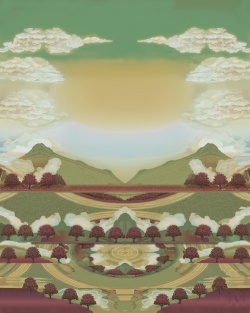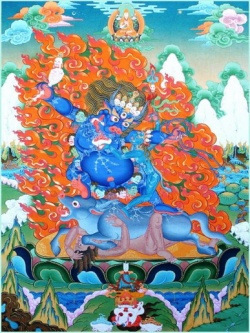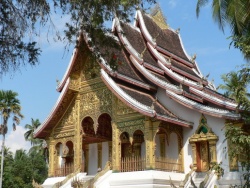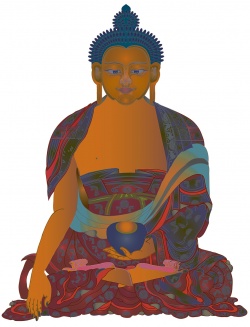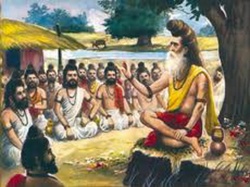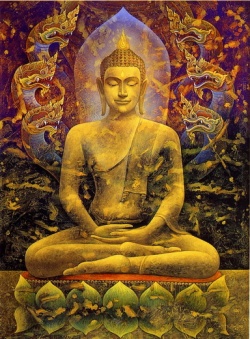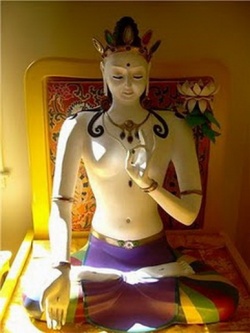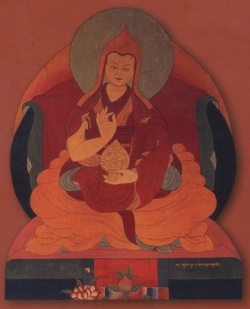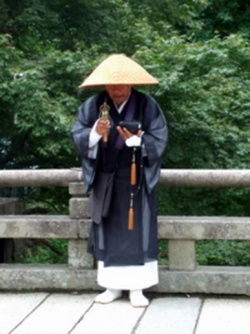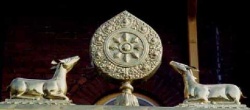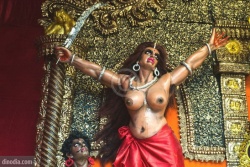Cathay: Translations & transformations
translations & transformations
Heinz Insu Fenkl
The Reincarnation of Hsing-chen (from Nine Cloud Dream c. 1689)
Kim Man-jung
(1637-1692)
here are five mythic mountains in the East. Near the Yellow Sea lies T’ai-shan, Great Mountain; to west is Hua-shan, Mountain of Flowers; to the south lies Heng-shan, the Mountain of Scales; to the north another Heng-shan, Eternal Mountain; and finally, in the center, stands Sung-shan, the Exalted Mountain. The highest of the five mountains is Heng-shan, south of Tung-t’ing Lake, encircled by the River Hsiang in the other three directions. It stands especially tall—the other mountains look up to it, as if to admire it. In all there are seventy-two peaks upon Heng-shan that rise up and pierce the sky, some jagged and precipitous, blocking the paths of clouds, their fantastic shapes evoking wonder and awe, their auspicious shadows full of good fortune.
Among the seventy-two peaks, the five tallest are called Spirit of the South, Crimson Canopy, Heaven’s Pillar, Stone Treasury, and Lotus Peak. They are regal and august, capped by the heavens, with clouds veiling their faces and their bases obscured in mist. They are imbued with divine power, and in the haze of the day they are occluded from human view.
In ancient times, when Yű restrained the Great Flood that T
HEINZ INSU FENKL
4
inundated the earth, he erected a commemorative stone tablet on one of these peaks, recording his many great deeds. The tablet was divinely inscribed in cloud calligraphy, and though many eons have passed, the characters are still sharp and clear. In the days of Chin Shi Wang Ti, a deva called Queen Wei, having become a Taoist immortal by divine decree, arrived with an attending company of fairies and settled in these mountains. She was known as Queen Wei of the Southern Peak, and many are the strange and wonderful things that she caused to happen there. In the days of the T’ang Dynasty a great monk arrived from India. He was so taken by the beauty of the mountains that he built a monastery on Lotus Peak, and there he preached the Buddhist sutras, instructed disciples, and banished demons and evil spirits. In time the name of the Gautama Buddha became widely known through him, and people came to pay homage and worship, saying that he himself was a living Buddha who had descended to earth. Those who were rich and noble shared of their material wealth, the poor contributed their labor, and thus a broad and spacious temple came to be built. It was secluded and quiet, with a thousand and one vistas all around—a majestic backdrop of mountains in the distance, a view without equal.
The monk had brought with him a volume of the Diamond Sutra, and he explicated it so clearly that they called him “Master of the Six Temptations,” the Great Master Liu-kuan. Among the five or six hundred disciples that followed him, there were some thirty who were advanced and well-versed in the teaching, and the youngest of these was Hsing-chen, whose name means “Without Guile.” His features were fair and handsome, and a light shone from his face like flowing water. He had already mastered the Three Sacred Books of the Tripitaka, though he was barely twenty. He surpassed all the others in wisdom and mental agility, and all knew that the Master loved him best and intended, in time, to make him his successor.
When Master Liu-kuan expounded upon the Dharma to his disciples, the Dragon King himself—in the guise of a white-clad old man—would come from Tung-t’ing Lake to listen and learn. CATHAY
5
One day the Master called his disciples together and said to them, “I am old now, and my body is frail. It is has been more than thirteen years since I have been beyond the gates of these mountains. I must go and pay my respects to the Dragon King. Who among you will go in my stead to the Underwater Palace?” Hsing-chen volunteered at once, and the Master was greatly pleased. He had the young monk fitted out in new robes; he presented him with his ringed staff of the gods and speedily sent him off in the direction of Tung-t’ing Lake. It was just at that moment that the monk who guarded the monastery’s main gate came to announce that Queen Wei of the Southern Peak had sent eight fairy messengers to see Master Liukuan. They were now waiting outside the gate. The Master commanded that they be admitted and, all modestly in line, they skipped through the gate, circled three times, and bowed, scattering fairy blossoms at his feet. Kneeling respectfully, they recited the message from Queen Wei: “The noble Master lives on the west side of the mountain, I on the east. The distance is not far, and we are near enough to be neighbors. Yet I am of humble birth and am so busy that I have not once visited your sacred temple to hear the Dharma. Lacking wisdom, I know not how best to maintain virtue and propriety, but now I am sending my servants to pay my respects and to offer Your Holiness flowers of paradise, fairy fruit, silks, and other humble gifts. It is my sincerest hope that you will accept them as a token of my earnest heart.” With that, each of the eight fairies presented her flowers and gifts to the Master, and he received them and passed them on to his disciples who, in turn, placed them as offerings before the Buddha. The Master bowed ceremoniously, with hands folded according to custom, and saying, “An old man like me hardly deserves such lavish gifts as these you have presented to me,” he gave generously to the fairies in return before they took their leave and set lightly off.
They made their way out through the mountain pass, walking hand in hand and chatting as they went. “The magical mountains of the south are all part of the same range, and they are encircled
6
by the same rivers. In the past, we were at liberty to go anywhere among them. But now that the Great Master Liu-kuan has established his temple, some of the peaks are forbidden to us, and we miss seeing the places of beauty that were once ours to view. We are lucky that our Lady’s order brings us to this valley at a beautiful time of year. It is still early, so let us take this chance to climb up to the top and breathe the sweet air of Lotus Peak. Let us dip our scarves in the pure waters, sing a song or two, and rekindle in our souls our joy for life. When we return, we will be admired and envied by our sisters. Let us go!” They set off, walking skillfully along the high precipices, following the cascading streams and gazing down in wonderment at the rushing waters. At length, on this auspicious day of the third month, they reached the stone bridge that spanned the torrent. They were spellbound by the beauty of the scene beneath them: flowers all in bloom, hanging entwined with leaves in silken canopies, clear waters sparkling like silver, birds each outdoing the other with their beautiful melodies, gentle breezes recalling glad memories.
The eight fairies were delighted. They sat enchanted on the bridge, looking down at their reflections where the streams met in the sparkling crystal pool. Their delicate brows and radiant faces were mirrored in the water like a classical painting done in a master’s hand, and they were so captivated they had no thought of moving on until the sun descended into the western mountains and the day grew dark.
At this very same moment Hsing-chen had crossed Tung-t’ing Lake and was entering the Underwater Palace. The Dragon King, full of gladness at his coming, personally came to the gate to greet him. He took the young monk by the hand and led him to his throne, which he bid him to share.
When Hsing-chen had made his obeisance and recited the message from his Master, the Dragon King bowed low in return. He commanded that a welcome feast be prepared—a splendid repast of fruits and delicacies of the kind known only to those who dwell among the mountains—and he personally offered Hsing
chen the wine, repeatedly urging him to drink. But Hsing-chen refused the cup time and again. “Your Highness, this humble monk cannot partake of the wine,” he said. “Wine unbalances and overstimulates the mind, and so it is strictly forbidden by the Buddha.”
“I know that wine is among the five things that Gautama forbade,” replied the Dragon King, “but this wine I offer is altogether different from the intoxicant that mortals drink. This wine calms the passions and quiets the mind. Surely, you do not doubt my intentions in offering it to you.” In the face of such generosity, Hsing-chen could not refuse. He drank three cups, said his goodbyes, and left the Underwater Palace, riding the wind directly to Lotus Peak. When he lighted there, the power of the wine was already obvious on his face, and he was overcome by dizziness. “Master will be shocked if he sees me this way,” he said to himself. “He will reprimand me most severely.”
Crouching by the bank of a stream, he took off his robes and placed them on the clean sand. He dipped his hands in the clear water and was washing his hot face, when suddenly he noticed a strange and mysterious scent wafting toward him. It was not the fragrance of orchid, or musk, or some exotic flower—it was something entirely new to him, something he had never before experienced. The scent seemed to dissolve in him all tinges of passion and uncleanness, leaving him with a feeling of ineffable purity. “What fantastic flowers must be growing by the stream to exude such sweet perfume into the air,” he thought. “I must investigate its source.”
He dressed carefully and followed the course of the stream upwards, and there, quite suddenly, he found himself face-to-face with the eight fairies who were sitting on the stone bridge. Hsing-chen put down his pilgrim’s staff and bowed deeply as he addressed them. “Ladies of the Fairy Realm, please hear what I have to say, though I am but a poor monk. I am a disciple of the Great Master Liu-kuan and I live on Lotus Peak. I am now on my way back from a mission on which the Master sent me beyond the
8
mountains. This bridge is not wide, and by sitting upon it, you are blocking my way. Dear goddesses, would you kindly move aside upon your lotus feet and let me pass?” The fairies returned his bow. “We are attendants to Queen Wei, and we are on our way back from delivering greetings to your Master. We have paused here to rest awhile. Is it not written in The Book of Rites, concerning the law of the road, that the man goes to the left and woman to the right? Since this bridge is very narrow, and we are already sitting here, is it not proper for you to avoid it altogether and cross at some other place?” “But the water is deep,” Hsing-chen replied. “There is no other way to cross. Where do you suggest this humble monk should go?”
“It is said that the great Bodhidharma crossed the ocean on a single leaf,” said the fairies. “If you are, in fact, a disciple of Master Liu-kuan and you have studied the Dharma with him, then surely you must have acquired some supernatural powers. It should not be hard for you to cross this tiny rivulet, so why do you stand there arguing with women over the right of way?” Hsing-chen laughed. “I see from your attitude that you require some sort of payment for the right to cross, but I have no money. I am only a poor monk. Yet I have do have eight jewels, which I will happily give to you if you will permit me to pass.” With this he plucked eight peach blossoms from a tree, held them between his palms, and tossed them before the fairies. What landed at their feet were four pairs of scarlet flowers, and these transformed into eight sparkling jewels that radiated their brilliant light high into to the heavens.
The eight fairies laughed with delight. Each of them rose from her place and lifted a scarlet flower, gave Hsing-chen a coy glance, mounted the wind, and sailed away through the air. Hsing-chen stood at the bridge and watched for a long time until they were lost in the clouds and their sweet fragrance had melted away. He felt a terrible loneliness and dejection come over him, as if he had failed in his highest aspirations. And that is how he returned to the temple and delivered his message from the CATHAY
9
Dragon King.
When the Master reprimanded him for his late return Hsingchen said, “The Dragon King treated me so generously, Master, it was impossible for me to refuse his kind request that I stay awhile. That is why I have been delayed.”
The Master did not reply to this. He said, simply, “Go away and rest.”
Hsing-chen went back to his meditation cell as the shadows of evening descended upon the day. Since he had seen the eight fairies, his ears had been echoing with their sweet voices, and he could not forget their beautiful faces and willowy forms. Try as he might, he found it impossible to control the thoughts that raced through his mind—he felt as if he were part drunkard and part madman. But he calmed himself and sat in his posture on the mat. He said to himself: “If a youth diligently studies the Confucian classics and serves his country as a minister of state or a general when he is grown into a man, he may dress in silks with an official seal upon his belt. He may serve the king, dispense favors among the people, look upon beauty with the eyes, and listen to sounds that delight the ears. He may have his fill of fame in this life and leave a legacy for future generations. But Buddhists have only a small bowl of rice and a jug of water. We study our dry tomes and count our mala beads until our hair goes white. It is a lofty and admirable religion, but the pit of vain desires it leaves unfulfilled is unspeakably deep. Though I may come to understand all the scriptures of the Mahayana path, though I may take the bodhisattva’s vow and rise to the exalted position of sage and master, once my mind and spirit dissolve into smoke and nothingness, who will know that a person called Hsing-chen ever lived upon this earth?”
His thoughts wandered; he tried to sleep, but sleep refused to come; the hour grew late. When he closed his eyes for a moment, the eight fairies appeared before him all in a row and drove away all thoughts of sleep. It suddenly occurred to him that the great purpose of Buddhism was to tame the mind and the heart. “I have been a monk for ten years,” he said, “and I had nearly succeeded
10
in overcoming the world of craving, but now my treacherous mind has gotten entangled in desire, much to the detriment of my soul.” He burned incense, knelt, stilled his thoughts, and was counting his mala beads, visualizing the thousand Buddhas that could help him, when suddenly one of the temple boys came to his window and said, “Brother, are you asleep? The Master is calling you.”
Hsing-chen was alarmed. “It is unusual for him to call me in the middle of the night. It must be something serious,” he thought. He followed the boy to the Hall of the Buddha, where all the monks of the temple had been assembled. The Master himself was sitting in solemn silence, brilliantly lit by the light of many candles. His appearance inspired both fear and curiosity, and when he spoke it was with great care, with grave intonation. “Hsing-chen! Do you know how you have sinned?” Hsing-chen was kneeling before the dais. He bowed low, until his head touched the floor, and he said, “Master, I have been your disciple for more than ten years now. I have never disobeyed a command. Nor have I failed to follow any order concerning our practice, in which I have had a part. I know only that I am dark with ignorance—I do not know what offense I have committed.” “There are three things that must be disciplined in one’s practice—the body, the mind, and the soul. When you went to the Dragon King, you drank wine, did you not? And on your return, by the stone bridge, you flirted at length with the messengers of Queen Wei. You gave them each a flower, joked with them, and spoke frivolously. And since your return, you have not put the memory of those events from your heart and mind. Instead, you have allowed yourself to be entangled by worldly desires, preoccupying yourself with riches and honor and all the other worldly temptations. You have turned away with distaste from the teachings of the Buddha, and thus your three degrees of attainment have all fallen from you in a single hour! You may no longer remain here.”
Hsing-chen wept and pleaded for forgiveness. “Great Master,” he said, “I have indeed sinned, but I was forced to break the rule CATHAY
11
that forbids drinking because the Dragon King compelled me. I talked with the fairies only because I was asking them to move out of the way. I had no ill intentions in my heart. How can you condemn me like this? I will return to my cell. Though impure thoughts tempt me with madness, I will keep my mind alert and overcome them. Surely, my true spirit will return. I will bite my hands and repent of the wrongs I have done, and my true heart will be restored. Does it not say in the teachings of Confucius that one can thus return to the right path? If I have done wrong, my most honorable Father, give me a flogging and set me right. Is that not according to the teaching of the Buddha? How could you banish me from all possibility of reform? I came to you when I was only twelve, I gave up my parents and relatives, I cut my hair and took refuge as a monk. Since then I have lived as your dependant, as if you yourself had begotten and raised me. The love between us is like that of a father and his only son. My cell is my sanctuary in this temple, and that is where my hopes all lie. Where else am I to go?”
“It is your desire to leave, and that is what makes me send you away,” said the Master. “If that were not so, what could ever make me cast you out of this place? You ask, ‘Where else am I to go?’ My answer is simple: ‘Go to the place you desire.’” Then, Master Liu-kuan shouted, “Come, constables!” and suddenly they materialized from the thin air—the yellow-hatted Emissaries of Hell. They bowed and awaited his orders. “Take this man into your custody,” said the Master. “Remove him to the Underworld and hand him over to Lord Yama, then come back and make your report to me.”
When Hsing-chen heard this he felt as if his spirit had left him. His eyes overflowing with tears, he fell upon the floor, crying, “Father! Father, please! Listen to what I have to say! In ancient times the Great Master Ananda broke all the laws of the Buddha when he visited the house of a prostitute and had intercourse her. But the noble Shakyamuni did not condemn him! He embraced Ananda and showed him the Dharma ever more clearly. I may have transgressed, but compared to Ananda, surely I am less
12
guilty! How can you send me to Hell?”
“When Ananda fell into sin, his mind was repentant,” Master Liu-kuan replied. “You, on the other hand, have lost your heart and mind upon a single glimpse of those seductive creatures. Your thoughts have turned toward a life of pleasure. Your mouth waters for worldly honor and wealth. You fare badly in a comparison with Ananda. You cannot escape the grief and suffering that await you, Hsing-chen!”
Hsing-chen could not imagine leaving, and he continued to cry for mercy until the Master finally relaxed his sternness and comforted him. “Hsing-chen, while your mind is impure, you will never attain enlightenment, even up here in the mountains,” he said. “But do not forget the Dharma. Hold true to it, and though you may mingle with dirt and impurities along the way, your return is assured. If it is ever your desire to return, Hsing-chen, then I shall go myself to bring you back, so do not doubt or question me. Now, go!”
There was nothing more to be said. Hsing-chen bowed low before the Master, said good-bye to his fellow monks, and went with the Emissaries of the Underworld.
They transported him, beyond the Lookout Pavilion, to the outer walls of Hell, and when the guards at the gate asked the cause of their coming, they said, “We have arrested this guilty man and bring him here at the orders of the Great Master Liu-kuan!” The guards opened the gates of Hell and let them through, into the inner court, where they once again announced their arrival. And it was Yama himself, Lord of the Underworld, who commanded that they bring him in. “Honored Sir,” he said to Hsing-chen, “though you abide in the hills under Lotus Peak, your name already rests on the incense table before the great King Ksitigarbha. I have thought to myself that in the future, when you ascend the Lotus Throne, all sentient creatures of the earth will be greatly blessed. So how is it that you have been arrested and dragged here before me in disgrace?”
Hsing-chen was confused and humiliated, and he did not reply for a long time. Finally, he said, “I met Queen’s Wei’s fairy CATHAY
13
maidens on the stone bridge of South Peak. I failed to restrain my carnal thoughts about them. I have sinned against my Master, and now, Your Majesty, I await your command.” Lord Yama sent a messenger to King Ksitigarbha with the following note:
The Great Master Liu-kuan of Lotus Peak has sent me one of his disciples, escorted by the Yellow Hats. We are to come to a judgment, here in the Underworld, as to his guilt. Since his case is not like that of ordinary offenders I asking your High Majesty’s council.
King Ksitigarbha replied:
Each man has his own path to perfection, and each is reborn in order to carry out the things necessary to fulfill his karma. No man can escape the cycle of samsara, and therefore there is no point in our discussing this case. Lord Yama was just about to come to a decision when two demon soldiers announced that the yellow-hatted Emissaries, by Master Liu-kuan’s commannd, had brought eight more criminals, who were now waiting outside the gate. Hsing-chen was greatly alarmed.
Lord Yama commanded that they be brought in—and behold!—the eight fairy maidens of the Southern Peak came haltingly through the gate and knelt down in the court. “Listen, fairy maidens of South Peak!” said Yama. “You fairy folk live in the most beautiful of known worlds. You enjoy uncountable pleasures and delights. How is it that you come to this place?” Greatly shamed, they replied in a babble of voices: “Our Mistress, Queen Wei, ordered us to pay a visit to the Great Master Liu-kuan to ask after his health and well being. On our way back to the Southern Peak, we met his disciple Hsing-chen. Because we talked with his disciple, Master Liu-kuan said that we had defiled the sacred laws of the mountains, and he wrote you to ask that we
14
be banished to the Underworld. All our hopes are with your Majesty, and we pray that you have mercy on us and allow us to go back to the world of the living.”
Lord Yama then called nine Emissaries, and they appeared before him. In a deep voice, he commanded, “Take these nine and return them at once to the world of the living.” He had hardly finished his pronouncement when a great whirlwind arose and carried the nine off into the void, where they were swirled apart and flung into the eight directions. Hsing-chen was borne along by the wind, hurled and tossed in endless space until, at last, he seemed to land on solid ground. When the storm calmed, Hsing-chen gathered his wits about him and found himself among a range of mountains bordered by a beautiful, clear river. Below him was a bamboo grove, and beyond that, through the shady branches of the trees, he could see a dozen houses with thatched roofs. Several people were gathered there, talking together within his earshot. “How marvelous it is!” they said. “The hermit Yang’s wife is past her fiftieth year, and yet she is going to have a child! We have been waiting for a long time, but have yet to hear the infant’s cry. These are anxious moments.” Hsing-chen said to himself: “I will be reborn into the world of humans. I can see that I am only a spirit now, for I have no body. I left it on Lotus Peak. It has been cremated already, and I am so young I have no disciples to recover my relics and keep them safe.”
As these ruminations about the past filled him with grief, one of Yama’s Emissaries appeared and motioned him over. “This is the Hsiu-chou township of Huai-nan province in the empire of T’ang,” he said. “And here is the home of the hermit Yang, who is your father. This is his wife, Liu, your mother. It is your karma to be reincarnated in this household, so go quickly. Do not miss this auspicious moment!”
Hsing-chen went in at once, and there sat the hermit wearing his reed hat and a coat of rough hempen cloth. He was preparing some sort of medicine on a brazier in front of him, and the fragrance filled the house. From the room came the indistinct
15
moaning of someone in pain. “Go in quickly. Now!” the Emissary urged again. When Hsing-chen continued to hesitate, the messenger gave him a hard push from behind.
Hsing-chen fell to the ground and instantly lost consciousness. It seemed that he had been propelled into some great natural cataclysm. “Help!” he cried. “Save me!” but the sounds caught in his throat, inarticulate, until they became the cries of an infant. The midwives quickly announced to the hermit that his wife had borne him a beautiful son, and Yang took her the medicinal drink he had prepared. They looked at each other, their faces full of joy.
Hsing-chen was suckled when he was hungry, and he ceased his crying when he was satisfied. As a newborn he still recalled the events of his previous life on Lotus Peak, but as he grew older and knew of the love of his parents, the memories of his former existence faded away, and soon they were entirely forgotten. When the hermit saw how handsome and talented he was, he stroked the child’s little brow and said, “Indeed, you are a gift from Heaven come to dwell among us.” And so he named him Shao-yu, meaning “Small Visitor,” and gave him the special nameCh’ien-li, meaning “A Thousand Li.” Time passes like flowing water, and in what seemed the space of moments, the boy grew to be ten years old. His face had the quality of jade and his eyes shone bright as the Morning Star. He was strong, and his mind pure and bright, showing that he was most certainly a Superior Man. The hermit said to his wife, “I do not originally come from this world, but because I am with you I have dwelt among the dust of this earth in this mortal form. The devas who live on Mount P’eng-lai have called upon me many times to return to them. But because of your hard work and your suffering, I have refused them. Now Heaven has blessed us with a son who shows great talents, who is superior to others in his attainments. You may rely on him now, and in your old age you will surely enjoy wealth and honor through his achievements. Therefore, I need no longer delay my departure.” One day the devas came to escort him, some riding on white
16
deer and some on blue herons, and they flew off together toward the distant mountains. Though a letter would come from time to time out of the clear blue sky, no traces of the hermit Yang were ever seen on this earth again.
